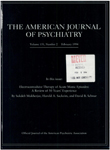Treatment of tardive dyskinesia with vitamin E
Abstract
OBJECTIVE: Vitamin E (alpha-tocopherol), a free-radical scavenger, has been reported to improve symptoms of tardive dyskinesia. The authors attempted to replicate this finding under more controlled conditions in a larger study group. METHOD: Fifteen inpatients and six outpatients with tardive dyskinesia received up to 1600 IU/day of vitamin E for 6 weeks in a double-blind, placebo-controlled crossover study. Abnormal Involuntary Movement Scale (AIMS) examinations of these patients were videotaped and rated independently by two trained raters. Levels of neuroleptic medication and vitamin E were measured during both treatment periods. Eighteen patients who demonstrated high blood levels of vitamin E were included in the data analysis. RESULTS: Vitamin E levels were significantly higher while the patients were receiving vitamin E than while they were receiving placebo. For all 18 patients, there were no significant differences between AIMS scores after receiving vitamin E and AIMS scores after receiving placebo. In agreement with previous studies, however, the nine patients who had had tardive dyskinesia for 5 years or less had significantly lower AIMS scores after receiving vitamin E than after receiving placebo. There were no changes in neuroleptic levels during vitamin E treatment. CONCLUSIONS: Vitamin E had a minor beneficial effect on tardive dyskinesia ratings in a selected group of patients who had had tardive dyskinesia for 5 years or less. This effect was not due to an increase in blood levels of neuroleptic medications.
Access content
To read the fulltext, please use one of the options below to sign in or purchase access.- Personal login
- Institutional Login
- Sign in via OpenAthens
- Register for access
-
Please login/register if you wish to pair your device and check access availability.
Not a subscriber?
PsychiatryOnline subscription options offer access to the DSM-5 library, books, journals, CME, and patient resources. This all-in-one virtual library provides psychiatrists and mental health professionals with key resources for diagnosis, treatment, research, and professional development.
Need more help? PsychiatryOnline Customer Service may be reached by emailing [email protected] or by calling 800-368-5777 (in the U.S.) or 703-907-7322 (outside the U.S.).



